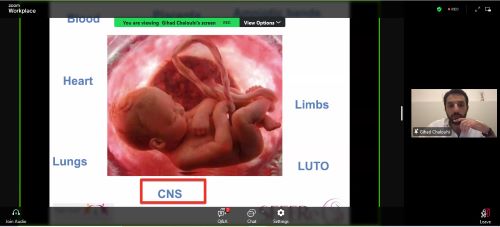Hamdan Bin Rashid Al Maktoum Foundation Hosts Webinar on Recent Updates in Antenatal Care

Hamdan Bin Rashid Al Maktoum Foundation for Medical and Educational Sciences recently organized a webinar titled “Recent Updates in Antenatal Care”. Held on the Zoom platform, the event attracted significant participation from healthcare experts and specialists worldwide.
The webinar spotlighted key developments in antenatal care, including increased early detection rates, improved management of pregnancy complications, technological innovations in obstetric interventions, and the expansion of comprehensive prenatal screening programs. It also emphasized the importance of standardizing practices based on the latest scientific evidence to enhance maternal and child health outcomes.
In her remarks, Dr. Salama Al Muhairi, Director of Medical Excellence at Hamdan Bin Rashid Al Maktoum Foundation, underlined the importance of such webinars in empowering healthcare professionals with up-to-date knowledge on diagnostics and obstetric care. She stated: “The advancement of antenatal care is a critical strategic goal in modern medicine due to its pivotal role in improving the overall health of mothers and newborns. Studies show that early diagnosis of pregnancy-related complications significantly improves delivery outcomes and reduces maternal and neonatal mortality and morbidity rates. Therefore, our focus must be on creating a comprehensive care environment that integrates cutting-edge technology with standardized medical practices to deliver the highest levels of care and prevention.”
Dr. Al Muhairi further highlighted the necessity of continuous education and medical training to keep pace with rapid advancements in genetics and early detection. “Advanced genetic screening now enables the early identification of specific conditions that may affect the mother or fetus, allowing for more precise and effective interventions. These updates compel us to establish sustainable partnerships between educational and medical sectors and develop interactive training programs that empower medical personnel with the latest scientific tools and advanced diagnostic techniques,” she added.
The webinar addressed vital topics, including the challenges and opportunities in digital-era antenatal care, as well as programs enhancing prenatal screening science. Discussions also focused on how continuous training for medical professionals can bridge gaps in knowledge and practice.
The event featured prominent international speakers, such as Prof. Yaser Faden, Chair and Department of Obstetrics and Gynecology at King Saud Bin Abdulaziz University for Health Sciences, Saudi Arabia; Dr. Sara Bisari, Technical Director of Cytogenetics at the National Reference Laboratory, UAE; and Dr. Jihad Chalouhi, Co-founder of the SFERE Center and fetal surgery expert at Necker Hospital for Sick Children, Paris, France. Their participation added a global perspective, sharing diverse experiences and expertise.
Moderated by Prof. Shamsa Al Awar, Chair of the Department of Obstetrics and Gynecology at UAE University, the session facilitated rich discussions and fruitful exchanges between speakers and participants.
The webinar concluded with recommendations advocating for advanced and comprehensive screening to detect genetic anomalies and potential risks early. It stressed the need to standardize medical practices based on the latest scientific evidence to improve the quality of care provided to mothers and children. Furthermore, the recommendations underscored the importance of investing in continuous medical education, emphasizing skill development for medical professionals to keep up with modern diagnostic and therapeutic technologies. Strengthening international collaboration between healthcare and research institutions was also highlighted to promote scientific research and knowledge exchange, ultimately contributing to better health outcomes for mothers and newborns globally.
Last Updated on 2 months by News Desk 1












